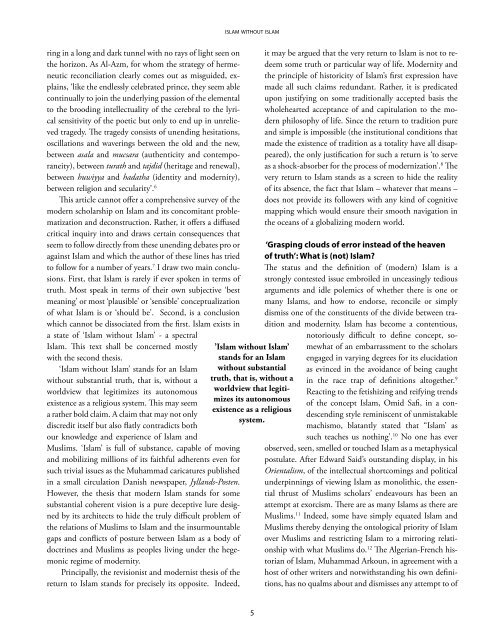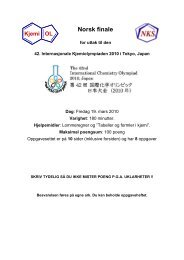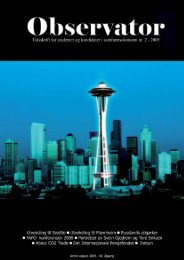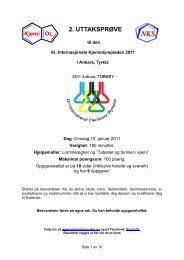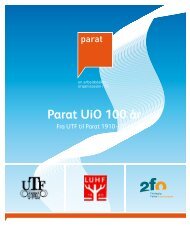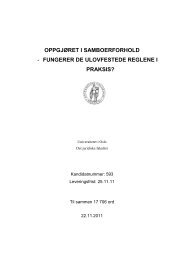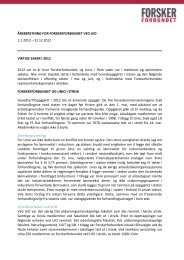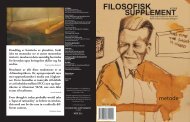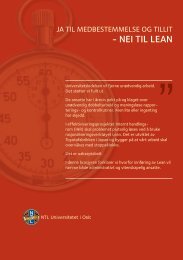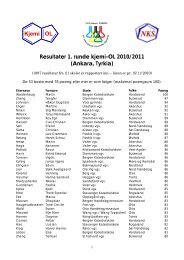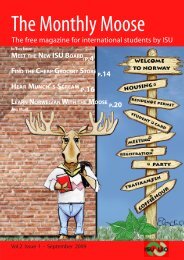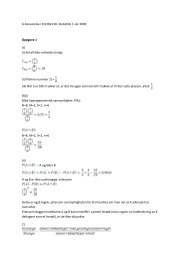filosofisk supplement - Universitetet i Oslo
filosofisk supplement - Universitetet i Oslo
filosofisk supplement - Universitetet i Oslo
- No tags were found...
You also want an ePaper? Increase the reach of your titles
YUMPU automatically turns print PDFs into web optimized ePapers that Google loves.
i sl a m w i t h o u t i sl a mring in a long and dark tunnel with no rays of light seen onthe horizon. As Al-Azm, for whom the strategy of hermeneuticreconciliation clearly comes out as misguided, explains,‘like the endlessly celebrated prince, they seem ablecontinually to join the underlying passion of the elementalto the brooding intellectuality of the cerebral to the lyricalsensitivity of the poetic but only to end up in unrelievedtragedy. The tragedy consists of unending hesitations,oscillations and waverings between the old and the new,between asala and mucsara (authenticity and contemporaneity),between turath and tajdid (heritage and renewal),between huwiyya and hadatha (identity and modernity),between religion and secularity’. 6This article cannot offer a comprehensive survey of themodern scholarship on Islam and its concomitant problematizationand deconstruction. Rather, it offers a diffusedcritical inquiry into and draws certain consequences thatseem to follow directly from these unending debates pro oragainst Islam and which the author of these lines has triedto follow for a number of years. 7 I draw two main conclusions.First, that Islam is rarely if ever spoken in terms oftruth. Most speak in terms of their own subjective ‘bestmeaning’ or most ‘plausible’ or ‘sensible’ conceptualizationof what Islam is or ‘should be’. Second, is a conclusionwhich cannot be dissociated from the first. Islam exists ina state of ‘Islam without Islam’ - a spectralIslam. This text shall be concerned mostlywith the second thesis.‘Islam without Islam’ stands for an Islamwithout substantial truth, that is, without aworldview that legitimizes its autonomousexistence as a religious system. This may seema rather bold claim. A claim that may not onlydiscredit itself but also flatly contradicts bothour knowledge and experience of Islam andMuslims. ‘Islam’ is full of substance, capable of movingand mobilizing millions of its faithful adherents even forsuch trivial issues as the Muhammad caricatures publishedin a small circulation Danish newspaper, Jyllands-Posten.However, the thesis that modern Islam stands for somesubstantial coherent vision is a pure deceptive lure designedby its architects to hide the truly difficult problem ofthe relations of Muslims to Islam and the insurmountablegaps and conflicts of posture between Islam as a body ofdoctrines and Muslims as peoples living under the hegemonicregime of modernity.Principally, the revisionist and modernist thesis of thereturn to Islam stands for precisely its opposite. Indeed,’Islam without Islam’stands for an Islamwithout substantialtruth, that is, without aworldview that legitimizesits autonomousexistence as a religioussystem.it may be argued that the very return to Islam is not to redeemsome truth or particular way of life. Modernity andthe principle of historicity of Islam’s first expression havemade all such claims redundant. Rather, it is predicatedupon justifying on some traditionally accepted basis thewholehearted acceptance of and capitulation to the modernphilosophy of life. Since the return to tradition pureand simple is impossible (the institutional conditions thatmade the existence of tradition as a totality have all disappeared),the only justification for such a return is ‘to serveas a shock-absorber for the process of modernization’. 8 Thevery return to Islam stands as a screen to hide the realityof its absence, the fact that Islam – whatever that means –does not provide its followers with any kind of cognitivemapping which would ensure their smooth navigation inthe oceans of a globalizing modern world.‘Grasping clouds of error instead of the heavenof truth’: What is (not) Islam?The status and the definition of (modern) Islam is astrongly contested issue embroiled in unceasingly tediousarguments and idle polemics of whether there is one ormany Islams, and how to endorse, reconcile or simplydismiss one of the constituents of the divide between traditionand modernity. Islam has become a contentious,notoriously difficult to define concept, somewhatof an embarrassment to the scholarsengaged in varying degrees for its elucidationas evinced in the avoidance of being caughtin the race trap of definitions altogether. 9Reacting to the fetishizing and reifying trendsof the concept Islam, Omid Safi, in a condescendingstyle reminiscent of unmistakablemachismo, blatantly stated that ‘‘Islam’ assuch teaches us nothing’. 10 No one has everobserved, seen, smelled or touched Islam as a metaphysicalpostulate. After Edward Said’s outstanding display, in hisOrientalism, of the intellectual shortcomings and politicalunderpinnings of viewing Islam as monolithic, the essentialthrust of Muslims scholars’ endeavours has been anattempt at exorcism. There are as many Islams as there areMuslims. 11 Indeed, some have simply equated Islam andMuslims thereby denying the ontological priority of Islamover Muslims and restricting Islam to a mirroring relationshipwith what Muslims do. 12 The Algerian-French historianof Islam, Muhammad Arkoun, in agreement with ahost of other writers and notwithstanding his own definitions,has no qualms about and dismisses any attempt to of5


